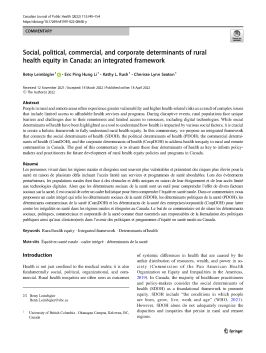Social, political, commercial, and corporate determinants of rural health equity in Canada: an integrated framework
“Compared to their counterparts in urban settings, rural and remote residents can face unique barriers such as lack of access to higher education, job opportunities, technologies and technology infrastructure (i.e. high-speed internet), comprehensive health services and goods, public funding and resources for sustainable community development.” (p. 750)
Social determinants of health, (income, education, housing, and more), have long been recognized as key factors influencing health outcomes. However, addressing these alone are not enough to achieve health equity, specifically in rural settings. Structural determinants such as the political environment, corporate influence, and availability resources cannot be overlooked as they play an important role in influencing the conditions of daily life and determining health.
In this commentary, published in the Canadian Journal of Public Health, key determinants to develop rural health equity policies and programs in Canada are defined. Integrating what the authors describe as political, commercial, and corporate determinants into a new framework is highlighted. The authors propose a set of recommendations formulated to inform policymakers, practitioners, and community leaders to address the evolving climate of health equity with rural considerations.
This set of proposals have four distinct foci, each with strategic recommendations:
- Develop an inclusive and diverse network to identify and co-define barriers faced by rural and remote communities in Canada.
- Leverage resources and capabilities through multisectoral and multidisciplinary collaboration in policy-making, research and development, program implementation, and impact assessment.
- Mobilize corporate and health policymakers to move beyond the “urban-centric” and “cost-benefit” mentalities and co-create a resilient and sustainable “rural-oriented” framework for residents in rural and remote Canada.
- Explore new forms of governance, organizations (e.g. social enterprise), platforms, and innovation (e.g. social innovation) to address rural health equity-related challenges.
Use this resource to:
- promote discussion on rural health inequities, rooted in structural and social determinants of health; and
- guide policymakers, practitioners, and community leaders through an integrated framework that fosters a solution and opportunity-focused environment to promote rural health equity.
Related Resources:
Defining and conceptualising the commercial determinants of health
Commercial determinants of health: Future directions
Let’s Talk: Values and health equity
Living health equity values in public health organizations: A review and dialogue-based tool
Foundational documents in health equity: A curated list
Policy avenues: Interventions to reduce social inequalities in health
See other resources that relate to healthy public policy.
Reference
Leimbigler, B., Li, E.P.H., Rush, K.L. et al. (2022). Social, political, commercial, and corporate determinants of rural health equity in Canada: an integrated framework. Can J Public Health 113, 749–754 https://doi.org/10.17269/s41997-022-00630-y
Tags: Access to health services, Healthy public policy, Rural / urban, Structural determinants, Public Health Association, Document, Commentary
